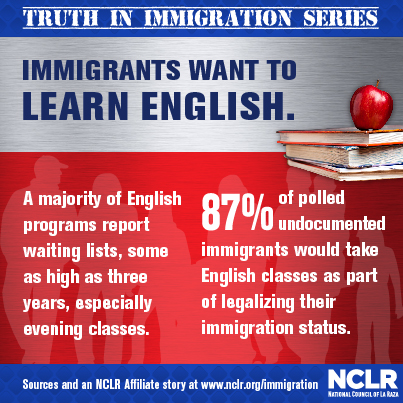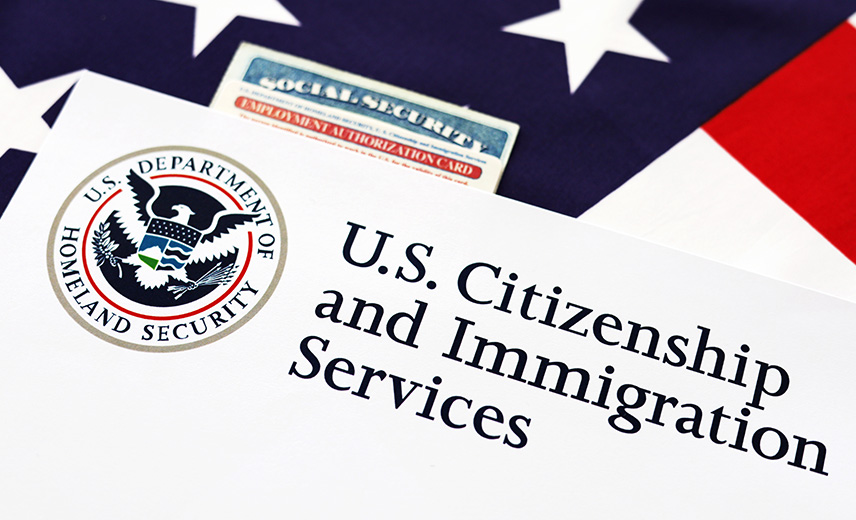Investments to Help Newcomers Learn English are Key
In the coming weeks, as the full Senate begins debate on the immigration reform bill, you’re sure to be bombarded with a lot of information on immigration. Some of that information will have to do with immigrants’ interests in fully integrating into American society. While immigrants are often criticized for not wanting to integrate, we saw amendments filed during the Senate Judiciary Committee’s markup process that intend to actually make it harder for them by striping money from important immigrant integration programs. We need to send a message to Congress that more investments are needed for immigrant integration, not less!
 One important measure of integration is learning English. While some may not realize it, one-third of Latino immigrants speak both English and Spanish. And for those who don’t yet speak English, the reality is that they do want to learn English. They want better jobs and better lives, and they understand that knowing English is vitally important to achieving those goals. In fact, a 2005 survey showed that 87% of undocumented immigrants would be willing to take ESL classes as part of their legalization process. The problem is not, as immigration reform detractors so often claim, a lack of will or drive to learn; it’s the lack of ESL classes available to the community. For the classes that are available, the wait-lists are often so long that interested students could wait more than three years. Add in the reduced federal funding of ESL and the problem is worsened.
One important measure of integration is learning English. While some may not realize it, one-third of Latino immigrants speak both English and Spanish. And for those who don’t yet speak English, the reality is that they do want to learn English. They want better jobs and better lives, and they understand that knowing English is vitally important to achieving those goals. In fact, a 2005 survey showed that 87% of undocumented immigrants would be willing to take ESL classes as part of their legalization process. The problem is not, as immigration reform detractors so often claim, a lack of will or drive to learn; it’s the lack of ESL classes available to the community. For the classes that are available, the wait-lists are often so long that interested students could wait more than three years. Add in the reduced federal funding of ESL and the problem is worsened.
Keep up with the latest from UnidosUS
Sign up for the weekly UnidosUS Action Network newsletter delivered every Thursday.
Still, community-based organizations are doing all they can to meet the demand for ESL classes. One such organization is Carlos Rosario International Public Charter School, an NCLR Affiliate in Washington, DC. This school serves more than 2,000 adult learners from 80 different countries. In a recent NPR story, their work was highlighted as well as the challenges it faces in providing this critical service.
Every year people start lining up at 3 a.m. to apply for admission, says Allison Kokkoros, the chief academic officer. She says they have 1,000 people on their waiting list right now. Waiting lists don’t roll over, so those who didn’t get in this year will have to line up again next year.
Wrigley [a national expert on adult learning with Literacywork] says when she gets asked, “why can’t immigrants just learn English?” she has to remind people how difficult it is to learn another language and how long it takes.
“It doesn’t just require that you learn the grammar and the pronunciation,” says Wrigley. “You need thousands of words. And you have to build what we call ‘communication competence’ that allows you to know not just what to say, but to whom and when, and what not to say.”
While the amendments to remove the modest funding for immigrant integration were not offered for a vote in the Senate Judiciary Committee, they may surface again during the full Senate debate. We will keep you informed here on the blog, and you can sign up for the NCLR Action Network to receive breaking alerts about the continuing immigration debate.


